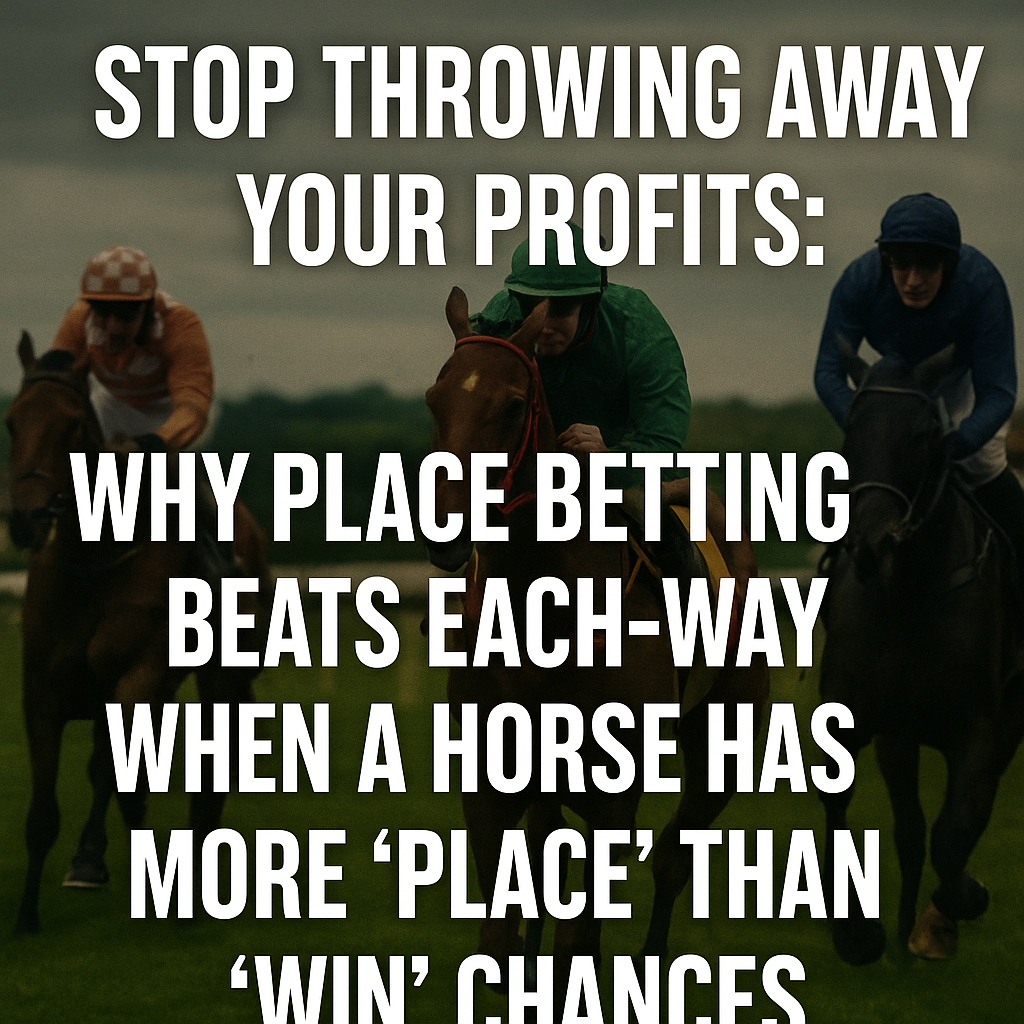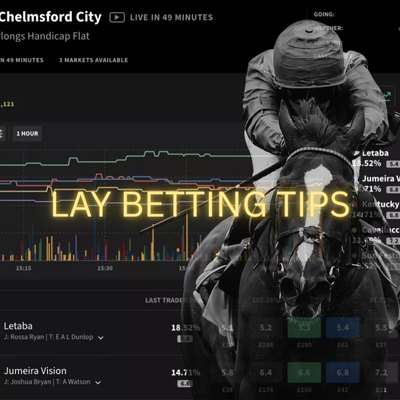The Hidden Secret: How Place Only Betting Boosts Your Horse Racing Profits
Are Your Each-Way Bets Secretly Costing You Money? Why Place-Only Betting Is a Smarter Horse Racing Strategy
Do you often find yourself backing a big-priced horse and muttering, “It probably won’t win, but I can see it placing”? You’re far from alone. Many punters think this way — yet still reach for the traditional each-way bet. While your instinct might be spot on, your staking method could be quietly draining your profits.
This post isn’t about picking winners. It’s about betting smarter, not harder, by aligning your stake with your true opinion. Here’s what we’ll cover:
Why the traditional each-way bet can be a financial drain, rather than the clever insurance you think it is.
How switching to place-only betting can significantly boost your profits and reduce wasted risk.
The psychological traps that tempt punters into betting for the win, even when they don’t truly believe it’ll happen.
Real-world examples showing the maths — both on a single bet and across 100 bets — revealing how place-only betting often wins out.
If you’re ready to sharpen your betting strategy and improve your bottom line, read on.
The Hidden Cost of Ego: When Each-Way Bets Don’t Reflect Your True Belief
Let’s be honest: not every bet is purely about maximising long-term profit. Sometimes, it’s about the thrill, the excitement — and crucially, the bragging rights. Saying “I backed that 16/1 winner!” sounds far better in the pub than “I had it to place.”
This craving for the big win, for the ego hit, often pushes punters to include the “win” part of an each-way bet — even when their logical side whispers, “This horse probably won’t beat the favourite.”
That psychological payoff comes at a cost. The £5 or £10 you stake on the win part of an each-way bet, when you only truly fancied a place, is often dead money — effectively a premium paid for a low-probability outcome.
.
✔️ Back it to place.
✔️ Bet what you actually believe — not what feels more satisfying if the result surprises you.
Your Goal: Bet What You Actually Believe
If your analysis suggests a horse is far more likely to place than win, the smartest play is clear: back it to place. Bet your conviction — not a distant hope that might satisfy your ego if the horse pulls off an upset..
A Straight Showdown: Each-Way vs. Place-Only (One Bet Example)
Let’s examine the stark difference between each-way and place-only staking on a single horse.
Imagine a horse called Smart Bet, priced at 16/1. Standard place terms are 1/5 the odds for finishing in the places, giving place odds of:
Place odds=165=3.2/1\text{Place odds} = \frac{16}{5} = 3.2/1Place odds=516=3.2/1
Two punters are equally confident Smart Bet can run well. Both want to stake £10 in total.
Punter A (Each-Way Bettor)
£5 win @ 16/1
£5 place @ 3.2/1
Punter B (Place-Only Bettor)
£10 place @ 3.2/1
Let’s explore how these bets play out in three scenarios:
Scenario 1: Smart Bet Wins the Race
Punter A (Each-Way):
Win: £5 × 16/1 = £80 profit + £5 stake = £85 return
Place: £5 × 3.2/1 = £16 profit + £5 stake = £21 return
Total Return: £106
Net Profit: £96
Punter B (Place-Only):
Place: £10 × 3.2/1 = £32 profit + £10 stake = £42 return
Net Profit: £32
Observation: Each-way punters profit significantly more when the horse wins. This is the “just in case” scenario many cling to.
Scenario 2: Smart Bet Places but Doesn’t Win
Punter A (Each-Way):
Win stake (£5) lost
Place: £5 × 3.2/1 = £16 profit + £5 stake = £21 return
Net Profit: £11
Punter B (Place-Only):
Place: £10 × 3.2/1 = £32 profit + £10 stake = £42 return
Net Profit: £32
Observation: When the horse places but doesn’t win, the place-only punter earns nearly three times as much profit (£32 vs. £11). Crucially, they bet precisely what they believed would happen.
Scenario 3: Smart Bet Fails to Place
Both punters lose their entire £10 stake.
Loss for Punter A: £10
Loss for Punter B: £10
No difference here — the risk of a total loss is the same for both.
The Cumulative Effect: 100 Bets Tell the Real Story
One bet can be misleading. The real truth emerges over volume. Let’s run the numbers for 100 similar bets:
Odds of each horse: 16/1
Win rate assumed: 5% (5 winners out of 100)
Place rate assumed: 35% overall (5 winners plus 30 additional placers)
Total staked: £1,000 (100 × £10)
Punter A (Each-Way) Over 100 Bets
Win Part Returns:
5 winners × £85 return = £425
Place Part Returns:
35 placers (5 winners plus 30 placed-only) × £21 return = £735
Total Returns: £425 + £735 = £1,160
Net Profit: £1,160 – £1,000 = £160 profit
Punter B (Place-Only) Over 100 Bets
Place Returns:
35 placers × £42 return = £1,470
Total Returns: £1,470
Net Profit: £1,470 – £1,000 = £470 profit
The Verdict: £160 Profit vs. £470 Profit
Across these 100 bets, place-only staking yields nearly triple the profit of each-way betting (£470 vs. £160).
Why such a massive difference? It comes down to the wasted win stakes. For those 30 horses that placed but didn’t win, Punter A effectively burned £5 per bet — that’s £150 sacrificed on win bets that had little chance of success.
Meanwhile, Punter B focused every penny on the most likely outcome: placing. That disciplined staking turned solid place predictions into far greater returns.
Unlock More Profit: Bet on Your Conviction, Not Just Hope
This isn’t about abandoning each-way betting entirely. There’s still a place for it when you genuinely believe a big-priced horse can win. But in the frequent scenario where you’re primarily hoping for a horse to hit the frame, place-only betting can be transformative.
It allows you to:
Maximise returns on your strongest view by turning “I fancy this to place” into proper profits.
Reduce wasted stake instead of funnelling money into win bets you don’t truly believe in.
Build consistent profit by capitalising on realistic strike rates that compound over time.
For many bettors, spotting horses likely to place is far more achievable than picking outright winners. Align your strategy with that reality, and you’ll transform near misses into consistent profits — and elevate your betting game.
So the next time you find yourself saying, “It probably won’t win, but it can place,” ask yourself the sharper question:
Why am I betting it to win at all?
Are you ready to stop letting ego and tradition chip away at your bankroll? Make place-only betting a core part of your strategy, and bet in line with what you truly believe.
Frequently Asked Questions
Is place-only betting only for outsiders at big prices?
No. Place-only betting can be valuable at any odds, particularly when you believe a horse will run well without necessarily winning. Even shorter-priced runners can be logical place-only bets if you’re targeting consistency rather than chasing a big payout.
Don’t I miss out on big wins if I bet place-only?
Yes, and that’s the trade-off. Place-only betting sacrifices the chance of a huge win for more consistent, sustainable profits. It’s about staking in line with your real expectations rather than gambling on an unlikely result.
Are place-only odds always good value?
Not always. In small fields or races with a dominant favourite, place-only odds can be shorter and sometimes poor value. It’s crucial to compare the place odds with the effective place portion of an each-way bet to see which option offers better returns.
Is it ever right to stick with each-way betting?
Absolutely. Each-way betting still makes sense when you genuinely believe your horse is a realistic winner, especially at big prices or when bookmakers offer enhanced place terms. The key is betting each-way because your analysis supports it — not simply out of habit or “just in case.”
Further Reading
If you found this article useful, you might also enjoy these deeper dives into smarter betting strategies and horse racing analysis:
Why I Focus on Lower-Grade Racing — And Find Value Others Miss
Explore how lower-class races often offer clearer profiling opportunities and bigger pricing inefficiencies than the higher-profile cards.Understanding Sectional Times: The Modern Bettor’s Secret Weapon
A comprehensive guide to interpreting sectionals, energy distribution, and how to spot horses running against the race shape.How to Build a Profitable Betting Shortlist Without Guesswork
Discover a structured approach to narrowing fields and focusing your staking on runners who truly fit today’s conditionsThe Psychology of Betting: How Emotion Sabotages Profits
Learn how common mental traps lead punters to stake inefficiently — and how to overcome them for long-term gains.
Betting isn’t just about picking winners — it’s about staking intelligently and betting in line with your genuine opinions. Explore the articles above to refine your approach and build a sharper edge.















